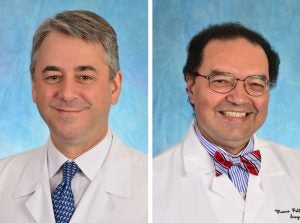Timothy Farrell, MD, Vice Chair of Education and Professor of Surgery along with Dr. Marco Patti, Professor of Surgery and Simulation Director was awarded a UNC_MAHEC Grant.

They received a grant in the amount of $38,000 for one year. Their grant was based on the following proposal:
Overview: Surgical simulation is appealing because it allows trainees to acquire skills in a safe, controlled and standardized environment before operating in patients. In addition, given restrictions in duty hours for residents and hospital safety regulations, it is almost impossible to acquire all necessary skills in a purely clinical environment. Current surgical simulators include box-trainers, virtual reality simulators, human cadavers and live animals. Box simulators are used for basic tasks such as knot tying. Virtual reality simulators lack haptic feedback, are extremely expensive, and do not allow group teaching. Cadavers are infrequently used because of their cost and limited availability. Live animals, while offering a realistic experience, are associated with ethical issues, high costs and need for specialized facilities.
In 2016, UNC developed a novel surgical simulator based on porcine tissue blocks (lungs, aorta, diaphragm, esophagus, stomach, duodenum, liver and spleen) positioned in a mannequin. These organs were perfused by selective cannulation of aortic branches. During the last two years, using this model, we have trained senior and chief residents performing laparoscopic and robotic fundoplications, myotomies and gastric resections. This training has resulted in a better performance in the OR, with a decrease in the operating time. This model was used in October 2018 at the American College of Surgeons to train practicing surgeons. Because of the success of this simulator, we now plan to build other simulators based on perfused tissue blocks, to allow resident training (open, laparoscopic and robotic) across sites in a variety of procedures, including:
- Ventral hernia repair
- Right colectomy
- Left colectomy
- Cholecystectomy
- Sleeve gastrectomy
- Roux-en-Y gastric bypass
- Splenectomy
- Liver resection
We aim to have a comprehensive curriculum, based on the residents’ level of training, as we do believe that this will translate in improved outcomes and safety for the patients and reduced costs for the health care system.
Responsible Faculty/Staff:
University of North Carolina: Timothy Farrell, MD, Marco Patti, MD, Marco DiCorpo, MD (fellow), Neal Murty
Mountain Area Health Education Center: Lindsee McPhail, MD, MPH, Michael Schurr, MD, Brian Charnock, MD, Ted Eby
